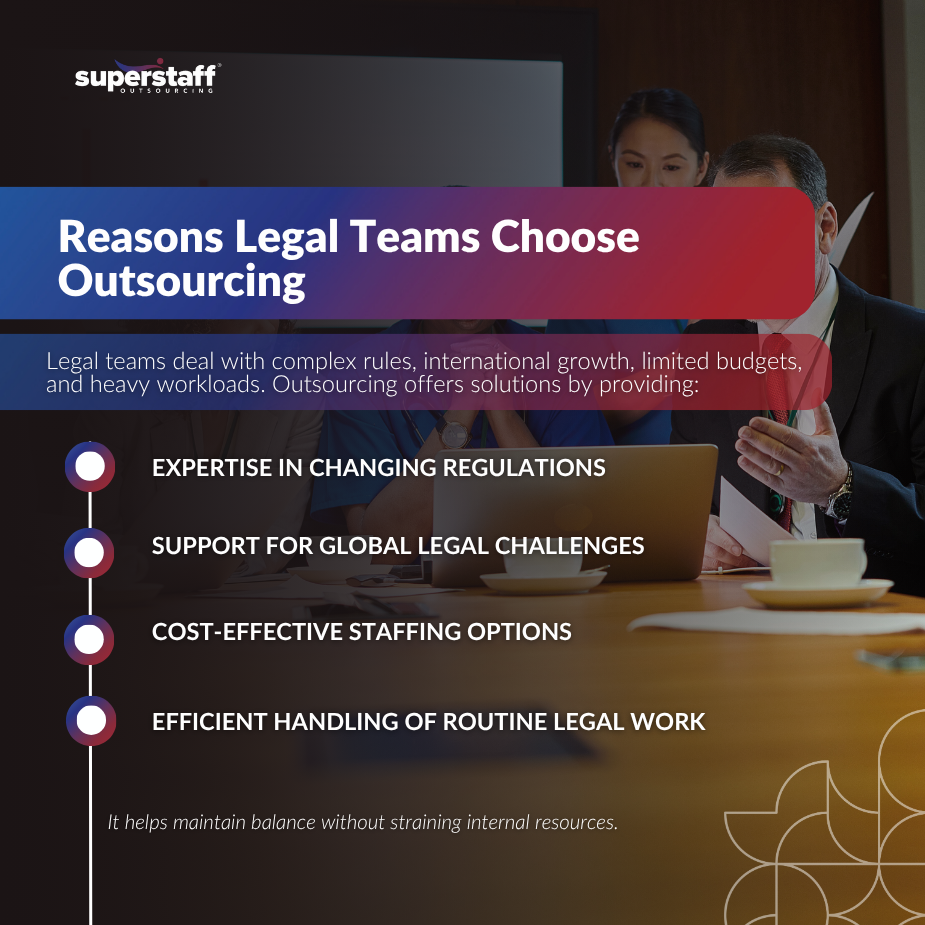
Legal departments now face challenges that go well beyond handling contracts and basic compliance. Changing regulations, complex global risks, and operational pressures push many in-house legal teams to reconsider how they manage their workloads. As a result, outsourcing in-house legal functions is becoming a practical approach to address these demands.
Outsourcing in-house legal services is no longer just about cutting costs. It helps legal departments handle fast-changing rules and rising risk with limited internal resources.
Exploring the key drivers behind why in-house legal teams are outsourcing in 2025 reveals how specific functions are shifting outside and why this trend supports stronger risk management in a complex legal environment.
Why Legal Teams Are Outsourcing In-House Legal Work

Several factors are driving the move to outsource in-house legal work. Many legal departments are stretched thin. They must keep up with new regulations in areas like data protection, environmental, social, and governance (ESG), and labor laws. Global growth adds pressure to handle legal matters across different languages and legal systems. Budgets often do not increase to match this complexity, leaving teams with fewer resources.
Some key reasons legal teams outsource include:
- Regulatory Demands – New laws require constant monitoring and adjustment, which can overwhelm small teams.
- Global Expansion – Companies entering new countries need local legal expertise that is hard to build internally.
- Budget Pressure – Hiring full-time staff for every new need is costly and slow.
- Speed and Volume – Routine legal tasks like contract reviews take time, but cannot be delayed.
These conditions push legal teams to consider outsourcing in-house legal functions to extend capacity without overloading staff. Outsourcing provides support where internal resources fall short.
Common Legal Tasks Being Outsourced
Outsourcing in-house legal work now encompasses a broader range of activities than just basic document review. Legal departments are reallocating entire streams of work to outside providers. Some commonly outsourced functions include:
-
Contract Lifecycle Management
- Reviewing, drafting, and redlining contracts
- Managing contract databases and renewals
-
Legal Research and Regulatory Tracking
- Monitoring changes in laws and regulations
- Preparing summaries and alerts for in-house counsel
-
eDiscovery and Compliance Audits
- Handling document collection and analysis in litigation
- Conducting audits to ensure regulatory compliance
-
Intellectual Property Filings
- Managing patent and trademark applications and renewals
- Managing patent and trademark applications and renewals
-
Lease Abstraction and Vendor Agreements
- Summarizing lease terms for easy reference
- Managing vendor contracts and obligations
Legal process outsourcing providers specialize in these functions, allowing internal legal teams to focus on complex strategic issues rather than routine tasks.
Strategic Benefits Beyond Cost Savings
Outsourcing in-house legal work is often thought of as a way to reduce spending, but the benefits go deeper than just procurement cost savings. Outsourcing offers flexibility, access to specialized talent, and improved risk management.
-
Access to Jurisdiction-Specific Expertise
Outsourcing providers often have lawyers familiar with local laws in multiple countries. This helps companies meet global legal requirements without hiring local counsel for every market.
-
Scalability
Legal needs can fluctuate quickly during mergers, litigation, or policy changes. Outsourcing allows teams to adjust capacity rapidly without permanent hires.
-
Standardization and Compliance
Routine legal processes can be standardized across the company through outsourcing. This reduces errors and supports consistent compliance.
-
Risk Forecasting Support
Specialized vendors can assist with analyzing regulatory risks and providing early warnings based on their focused experience.
These strategic gains make outsourcing in-house legal functions a strong choice for teams managing complex legal landscapes.
Managing Risks in Legal Outsourcing
Outsourcing legal work involves risks that require careful attention. It is not a simple cost-saving exercise and carries potential issues such as:
- Data Security and Confidentiality – Legal teams handle sensitive information. Ensuring vendors maintain strict data security is essential.
- Knowledge Gaps – Outside providers may not fully understand a company’s internal policies or standards. Proper onboarding and training are necessary.
- Regulatory and Licensing Restrictions – Some jurisdictions limit which tasks can be outsourced or who can perform legal services.
- Oversight Challenges – Managing external providers takes time. Too much oversight can reduce the time saved, but too little increases risk.
These risks mean that companies must adopt a compliance-first approach to selecting and supervising legal process outsourcing providers. Structured contracts, clear communication, and regular audits help reduce potential problems.
When Outsourcing In-House Legal Work Makes Sense
Not all legal departments will benefit equally from outsourcing. The best candidates often share these characteristics:
-
Rapid Growth and New Markets
Companies expanding internationally find outsourcing helpful for handling local legal work without building large internal teams.
-
Lean Legal Departments
Small teams covering multiple countries can gain relief by outsourcing routine work and specialized tasks.
-
High-Volume Contract Work or Frequent Audits
Outsourcing supports legal teams facing large contract loads or recurring compliance checks.
-
Businesses Undergoing Restructuring or Divestitures
Legal demands spike during organizational changes. Outsourcing adds capacity during these times.
For legal teams fitting these profiles, outsourcing in-house legal functions creates more space to focus on core legal work with higher impact.
Legal Outsourcing for Smarter, Safer Operations
Outsourcing is helping in-house legal teams handle growing workloads, manage compliance, and respond to global risks. With the right structure and vendor support, it becomes a practical solution for maintaining control and quality.
If your legal team is stretched thin, SuperStaff can help. We provide legal outsourcing services such as contract management, regulatory research, eDiscovery support, and IP filings, built around compliance and jurisdiction-specific knowledge.
Let SuperStaff support your legal team with services that combine speed, accuracy, and risk control. Contact us today to learn more.






